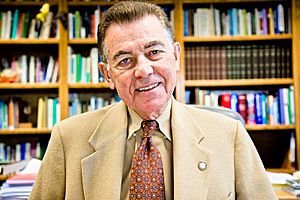Francisco J. Ayala facts for kids
Quick facts for kids
Francisco J. Ayala
|
|
|---|---|
 |
|
| Born |
Francisco José Ayala Pereda
March 12, 1934 |
| Died | March 5, 2023 (aged 88) |
| Nationality | Spanish-American |
| Citizenship | Spanish, American (1971–2023) |
| Alma mater | University of Salamanca, Columbia University |
| Known for | Population genetics |
| Spouse(s) | Mary Henderson (m. 1968, div) Hana Lostokova Ayala (m. 1985) |
| Awards | National Medal of Science, Templeton Prize |
| Scientific career | |
| Fields | Biology, Genetics |
| Institutions | University of California, Davis (1971 - 1989) University of California, Irvine (1989-2018) |
| Doctoral advisor | Theodosius Dobzhansky |
| Doctoral students | John Avise |
Francisco José Ayala Pereda (born March 12, 1934 – died March 5, 2023) was an important scientist from Spain and the United States. He was an evolutionary biologist and philosopher. He taught for many years at the University of California, Irvine and University of California, Davis.
Before becoming a professor, Ayala was the president and chairman of the American Association for the Advancement of Science. At the University of California, Irvine, he held several important teaching positions. He was known for his work in biology, philosophy, and the philosophy of science.
Contents
Early Life and Learning
When he was younger, Francisco Ayala was a Dominican priest. He became a priest in 1960, but left that same year.
He went to the University of Salamanca in Spain. After finishing his studies there, he moved to the United States in 1961. He wanted to get his PhD at Columbia University.
His teacher for his doctorate was Theodosius Dobzhansky, a famous scientist. Ayala earned his PhD in 1964. He became a US citizen in 1971.
What He Was Known For
Francisco Ayala was famous for his studies in population genetics and evolutionary genetics. People called him the "Renaissance Man of Evolutionary Biology." This means he was good at many different things in his field.
His Research
His scientific discoveries helped find new ways to prevent and treat diseases. These diseases affect millions of people around the world. For example, he showed that the tiny living things causing Chagas disease mostly reproduce by making copies of themselves. This disease affects many people in South America.
His Ideas and Beliefs
Ayala was part of a group that supported the idea of separation of church and state. He also spoke out against rules that limited money for embryonic stem cell research.
He did not agree with intelligent design theories. He believed these ideas were not scientific. He also thought they misunderstood religious ideas. Ayala suggested that the theory of evolution could help explain difficult questions about why bad things happen.
He believed that science and religious faith could go together. He once said that "science is compatible with religious faith in a personal, omnipotent and benevolent God." He did not often talk about his own religious beliefs.
In 2011, Ayala gave $10 million to the University of California, Irvine. This money was for the university's School of Biological Sciences.
Awards and Special Recognition
Francisco Ayala received many important awards for his work. In 2001, he was given the National Medal of Science. This is one of the highest honors for scientists in the United States.
In 2007, he received a special medal from Mount Saint Mary's University. He also got the Gold Honorary Gregor Mendel Medal from the Czech Academy of Sciences. Other awards include the Gold Medal of the Accademia Nazionale dei Lincei and the Scientific Freedom and Responsibility Award.
In 2010, he won the Templeton Prize. This award honors people who have made important discoveries about life's spiritual dimension.
From 2010 to 2018, the science library at the University of California, Irvine was named after him. In 2014, the School of Biological Sciences at UCI was also named the Francisco J. Ayala School of Biological Sciences. However, in 2018, his name was removed from both the library and the school.
Ayala was also chosen as a Fellow of the American Academy of Arts and Sciences in 1977. He was a member of many other important science groups around the world. He also received honorary degrees from many universities.
His Family Life
Francisco Ayala was born to Francisco Ayala and Soledad Pereda. He married Mary Henderson in 1968. They had two sons, Francisco José and Carlos Alberto. Later, they divorced.
In 1985, he married Hana Ayala, who is an ecologist. They lived in Irvine, California. Francisco Ayala passed away on March 5, 2023, at the age of 88.
Books He Wrote
Francisco Ayala wrote many books and articles, over 950 publications and 30 books! Here are a few of his books:
- Ayala, F.J. Evolution, Explanation, Ethics and Aesthetics: Towards a Philosophy of Biology. Academic Press: 2016. ISBN: 9780128036938
- Ayala, F.J. Am I a Monkey: Six Big Questions About Evolution. Johns Hopkins University Press: Baltimore, MD, USA 2010.
- Ayala, F.J. Darwin’s Gift to Science and Religion. Joseph Henry Press: Washington, DC, xi + 237 pp. 2007
- Ayala, F.J. Darwin and Intelligent Design. Fortress Press: Minneapolis, MN, xi + 116 pp. 2006.
See also
 In Spanish: Francisco José Ayala para niños
In Spanish: Francisco José Ayala para niños
- List of celebrities who own wineries and vineyards

